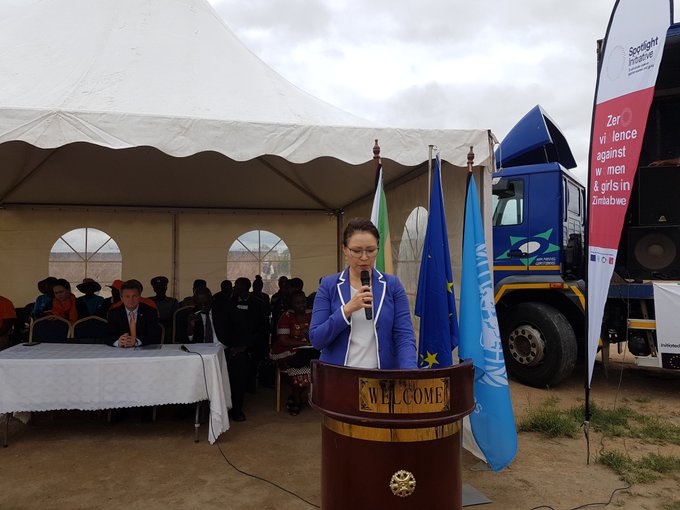In the 16 days of Activism Against Gender Based Violence period the United Nations Population Fund (UNFPA) and the Government of Zimbabwe with the support of the European Union today launched the mobile One Stop Centres in an effort to ensuring access to services for survivors of Gender Based Violence (GBV).
The launch of the mobile One Stop Centre campaigns is being launched under the joint UN-EU Spotlight Initiative set up by the European Union to end the problem of GBV in Zimbabwe.
“The Government of Zimbabwe acknowledges that GBV is a protection priority and therefore seeks to scale up efforts in ensuring holistic service provision to survivors of Gender Based Violence,” said the Minister of Women Affairs. Community, Small and Medium Enterprises Development Sithembiso Nyoni in a speech a read of her behalf. “As we do so, we are taking services to the people through mobile one stop centres that are offering on-the-spot services in communities.”
Gender Based Violence remains a huge problem in the Country. The Zimbabwe Demographic Health Survey for 2015 confirms that violence against women and girls remains a huge problem. At least 1 in every 3 women aged 15-49 having experienced physical violence since the age of 15 & 27% percent of women 15-49 have experienced sexual violence at some point in their lives.
“The one stop centre for survivors of GBV is a concrete manifestation of the Spotlight Initiative,” said European Union Ambassador to Zimbabwe HE Timo Olkkonen at the launch. “The Initiative is implemented by the UN and funded by the EU for up to USD$30 million. With Spotlight, Zimbabwe is really under the Spotlight. The Initiative should bring a massive positive change for women and girls and combat GBV in both private and public spheres.”
Ensuring timely access to services to survivors especially health services for survivors of sexual violence is very important. Over the years, UNFPA and its partners have set up the One Stop Centre centres, which allow survivors access to medical services, psycho-social services, legal and counselling services under one roof. Very often, police stations and hospitals do not provide an appropriate atmosphere to report GBV and in most communities, services are often located in different physical locations and thereby inhibiting rather than facilitating timely and efficient responses. Under the Spotlight Initiative UNFPA, Government of Zimbabwe and other partners are piloting the roll out of mobile One Sop Centre services to hard to reach areas by district level multi sectoral teams.
“Where GBV cannot be prevented quality services for survivors must be available, accessible, affordable and appropriate to avoid further trauma,” said UNFPA Deputy Representative Gulnara Kadyrkulova. “We take on this profound journey with that in mind and look forward to the support of all our partners. UNFPA will pilot this campaign in selected districts, document lessons for improvement and hopefully expand to all districts in the country having addressed challenges during this pilot phase.”
While looking at taking essential services to the people the mobile One Stop Centre campaigns are looking at raise awareness about the various services available to survivors and communities. While the outreach teams are conducting the mobile campaigns partners will be conducting social mobilisation through road shows in various Spotlight Initiative districts.
